Uw winkelwagen
Uw winkelwagen is leeg
Bedrijfsnieuws
Onze kruiden
Onze suikers
Onze kroonkurken
-
 Kegcaps 64 mm, Red 150 Sankey S-type (EU) (1000/box)
Toevoegen aan kar
Kegcaps 64 mm, Red 150 Sankey S-type (EU) (1000/box)
Toevoegen aan kar
-
 Kegcaps 64 mm, Red 102 Sankey S-type (EU) (1000/box)
Toevoegen aan kar
Kegcaps 64 mm, Red 102 Sankey S-type (EU) (1000/box)
Toevoegen aan kar
-
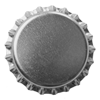
 CC29mm TFS-PVC Free, Silver without oxygen scav.(6500/box)
Toevoegen aan kar
CC29mm TFS-PVC Free, Silver without oxygen scav.(6500/box)
Toevoegen aan kar
-
 Kroonkurken 26mm TFS-PVC Free, Cyan Opaque col. 2616 (10000/box)
Toevoegen aan kar
Kroonkurken 26mm TFS-PVC Free, Cyan Opaque col. 2616 (10000/box)
Toevoegen aan kar
-
 Kegcaps 64 mm, Goud 116 Sankey S-type (EU) (1000/box)
Toevoegen aan kar
Kegcaps 64 mm, Goud 116 Sankey S-type (EU) (1000/box)
Toevoegen aan kar
Bier Recepten
Woordenlijst
The use of CO2 produced by the fermenting beer to carbonate the beer. For example, when you measure out the desired amount of corn sugar or malt extract for bottling, then seal the bottles, you are employing natural carbonation. This term is a bit of a misnomer since there isn't really any such thing as unnatural carbonation. CO2 is CO2, no matter where it comes from.
Carbonated by a second fermentation in the bottle or cask.
A bottle, 15 liters in capacity.
National Homebrew Competition. An annual homebrew competition sponsored by the American Homebrewers Association. Brewers submit entries to a first round judging in their geographic area; winners from the first round judging advance to a second round (national) judging.
An ion that causes foaming in beer.
An ion that, while harmless in itself, can be reduced to nitrite by certain "wort spoiler" bacteria.
An ion that interferes with yeast metabolism.
A colorless, gaseous element, tasteless and odorless, constituting about four-fifths of the atmosphere by volume and a constituent of all living tissues.
The percentage of the weight of barley or malt that is nitrogen. Protein content of the grain is about 6.25 times the nitrogen content.
The practice of dispensing beer using a mixture of carbon dioxide and nitrogen, instead of straight carbon dioxide. This results in a lower overall carbonation level, since nitrogen is less soluble in beer. When used in conjunction with a special "sparkler" attachment on the dispensing faucet, nitrogen dispensing results in a creamy, "draft Guinness style" head.
Used to pressurize stouts to give a rich creamy head.
An on-site device used to produce Nitrogen gas by filtering the Nitrogen from the air. Used in high volume accounts to reduce costs associated with refilling Nitrogen tanks, and where changing tanks can be a burden.
Hop varieties stemming primarily from Germany, the UK and the Czech Republic, which have been in existance for a very long time. Most other hop varieties trace their origins to the noble ones, which are characterized by low levels of bitterness. Noble hop varieties include Hallertauer, Saaz, Spalt, and Tettnanger.
The term "noble hops" traditionally refers to varieties of hops which are low in bitterness and high in aroma. They are the European cultivars or races Hallertau, Tettnanger, Spalt, and Saaz.[33] They are not bred as "modern" hop varieties but they are wild hops found and named for a specific region or city in which they were first found or by the farmer which found them or first propagated them. They contain high amounts of the hop oil humulene and low amounts of alpha acids cohumulone and adhumulone, as well as lower amounts of the harsher-tasting beta acids lupulone, colupulone, and adlupulone.[citation needed]
Their low relative bitterness but strong aroma are often distinguishing characteristics of European-style lager beer, such as Pilsener, Dunkel, and Oktoberfest/Märzen. In beer, they are considered aroma hops (as opposed to bittering hops); see Pilsner Urquell as a classic example of the Bohemian Pilsener style, which showcases noble hops.
As with grapes, the location where hops are grown affects the hops' characteristics. Much as Dortmunder beer may within the EU be labelled "Dortmunder" only if it has been brewed in Dortmund, noble hops may officially be considered "noble" only if they were grown in the areas for which the hop varieties (races) were named.
English noble varieties are Fuggle, East Kent Goldings and Goldings. They are characterized through analysis as having an alpha:beta ratio of 1:1, low alpha-acid levels (2–5%) with a low cohumulone content, low myrcene in the hop oil, high humulene in the oil, a ratio of humulene:caryophyllene above three, and poor storability resulting in them being more prone to oxidation. In reality, this means they have a relatively consistent bittering potential as they age, due to beta-acid oxidation, and a flavour that improves as they age during periods of poor storage.[34]
Hallertau or Hallertauer–The original German lager hop; named after Hallertau or Holledau region in central Bavaria. Due to susceptibility to crop disease, it was largely replaced by Hersbrucker in the 1970s and 1980s. (Alpha acid 3.5–5.5% / beta acid 3–4%)
Žatec–Noble hop used extensively in Bohemia to flavor pale Czech lagers such as Pilsner Urquell. Soft aroma and bitterness. (Alpha acid 3–4.5% /Beta acid 3–4.5%)
Spalt–Traditional German noble hop from the Spalter region south of Nuremberg. With a delicate, spicy aroma. (Alpha acid 4–5% / beta acid 4–5%)
Tettnang–Comes from Tettnang, a small town in southern Baden-Württemberg in Germany. The region produces significant quantities of hops, and ships them to breweries throughout the world. Noble German dual-use hop used in European pale lagers, sometimes with Hallertau. Soft bitterness. (Alpha acid 3.5–5.5% / beta acid 3.5–5.5%)
Their low relative bitterness but strong aroma are often distinguishing characteristics of European-style lager beer, such as Pilsener, Dunkel, and Oktoberfest/Märzen. In beer, they are considered aroma hops (as opposed to bittering hops); see Pilsner Urquell as a classic example of the Bohemian Pilsener style, which showcases noble hops.
As with grapes, the location where hops are grown affects the hops' characteristics. Much as Dortmunder beer may within the EU be labelled "Dortmunder" only if it has been brewed in Dortmund, noble hops may officially be considered "noble" only if they were grown in the areas for which the hop varieties (races) were named.
English noble varieties are Fuggle, East Kent Goldings and Goldings. They are characterized through analysis as having an alpha:beta ratio of 1:1, low alpha-acid levels (2–5%) with a low cohumulone content, low myrcene in the hop oil, high humulene in the oil, a ratio of humulene:caryophyllene above three, and poor storability resulting in them being more prone to oxidation. In reality, this means they have a relatively consistent bittering potential as they age, due to beta-acid oxidation, and a flavour that improves as they age during periods of poor storage.[34]
Hallertau or Hallertauer–The original German lager hop; named after Hallertau or Holledau region in central Bavaria. Due to susceptibility to crop disease, it was largely replaced by Hersbrucker in the 1970s and 1980s. (Alpha acid 3.5–5.5% / beta acid 3–4%)
Žatec–Noble hop used extensively in Bohemia to flavor pale Czech lagers such as Pilsner Urquell. Soft aroma and bitterness. (Alpha acid 3–4.5% /Beta acid 3–4.5%)
Spalt–Traditional German noble hop from the Spalter region south of Nuremberg. With a delicate, spicy aroma. (Alpha acid 4–5% / beta acid 4–5%)
Tettnang–Comes from Tettnang, a small town in southern Baden-Württemberg in Germany. The region produces significant quantities of hops, and ships them to breweries throughout the world. Noble German dual-use hop used in European pale lagers, sometimes with Hallertau. Soft bitterness. (Alpha acid 3.5–5.5% / beta acid 3.5–5.5%)
Beer O'clock
The overall aroma of a beer, best observed with short sniffs of a beer that has been poured into a wide rimmed glass.
The practice of omitting the sparge step in an all-grain batch. The liquid is simply drained from the mash tun, and the kettle is topped up with plain water. No-sparge brewing results in reduced extraction efficiency (so more grain must be used for a given OG), but simplifies and shortens the brewing process. Some respected authors (e.g. George Fix) claim that it also results in a more flavorful beer. See also parti-gyle.





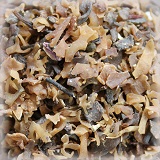
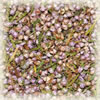
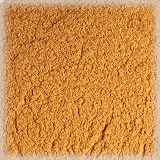
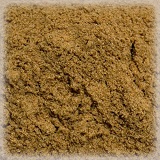
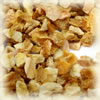
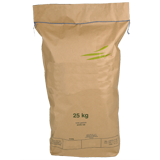
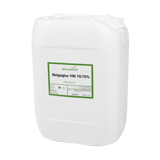
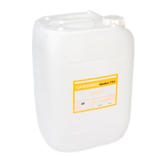
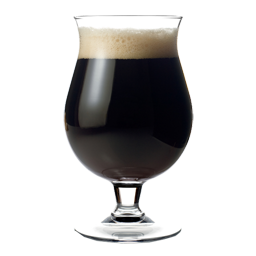
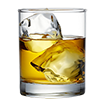
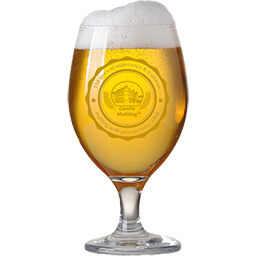
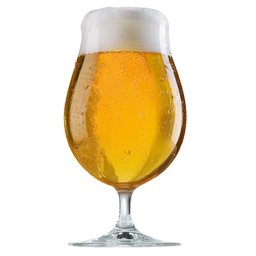
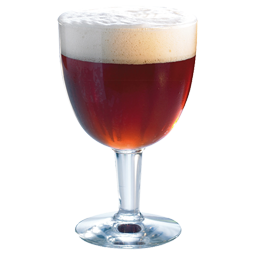
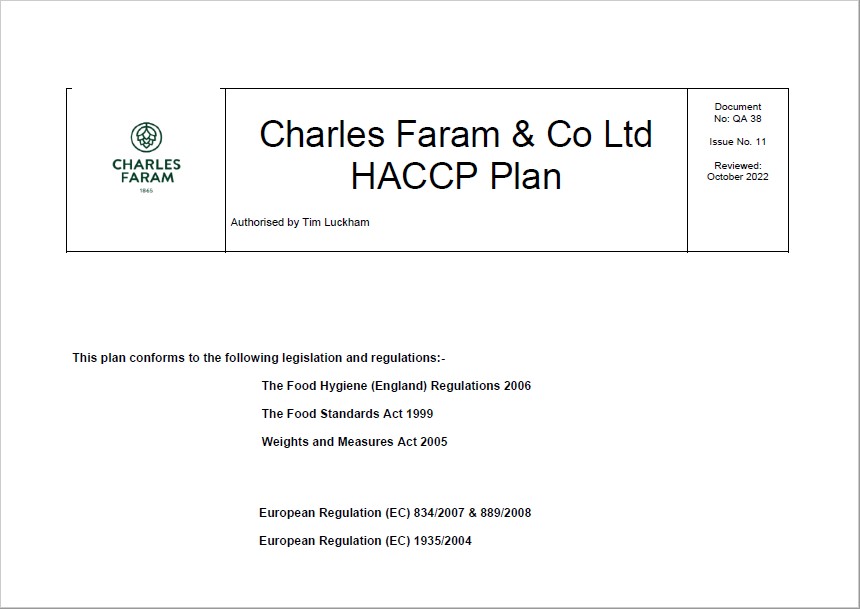 Charles Faram Hops, HACCP Plan QA38, EN 2022
Charles Faram Hops, HACCP Plan QA38, EN 2022
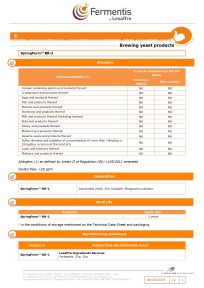 Fermentis - Brewing Yeasts Information ENG - SpringFerm BR-2
Fermentis - Brewing Yeasts Information ENG - SpringFerm BR-2
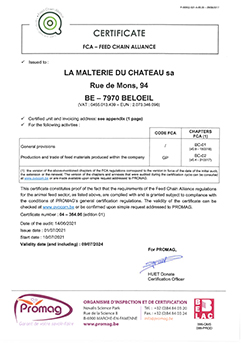 La Malterie du Chateau| FCA Malt Certificate 2022 (English) (2021-2024)
La Malterie du Chateau| FCA Malt Certificate 2022 (English) (2021-2024)
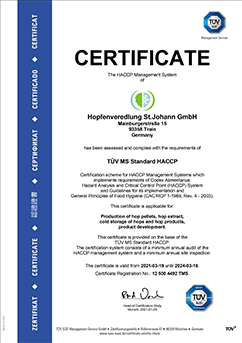 Hops Hopfenveredlung St.Johann, HAACP Certificate 2021-2024
Hops Hopfenveredlung St.Johann, HAACP Certificate 2021-2024
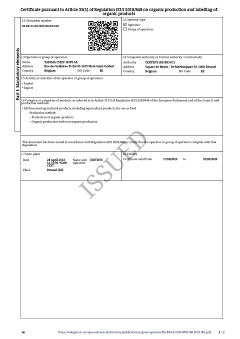 Hops Yakima Chief, Certificate Bio 2023-2026
Hops Yakima Chief, Certificate Bio 2023-2026



